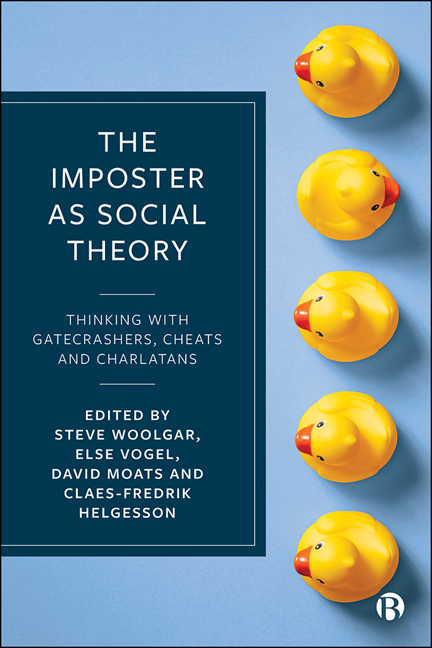Book contents
- Frontmatter
- Contents
- List of Figures and Boxes
- Notes on Contributors
- Preface
- 1 Thinking with Imposters: The Imposter as Analytic
- 2 The Desire to Believe and Belong: Wannabes and Their Audience in a North American Cultural Context
- 3 A Menagerie of Imposters and Truth-Tellers: Diederik Stapel and the Crisis in Psychology
- 4 Learning from Fakes: A Relational Approach
- 5 Imitations of Celebrity
- 6 Natural Imposters? A Cuckoo View of Social Relations
- 7 Conjuring Imposters: The Extraordinary Illusions of Mundanity
- 8 States of Imposture: Scroungerphobia and the Choreography of Suspicion
- 9 The Face of ‘the Other ’: Biometric Facial Recognition, Imposters and the Art of Outplaying Them
- 10 Faking Spirit Possession: Creating ‘Epistemic Murk ’ in Bahian Candomblé
- 11 The Guerrilla’s ID Card: Flatland against Fatland in Colombia
- 12 Good Enough Imposters: The Market for Instagram Followers in Indonesia and Beyond
- 13 Thinking beyond the Imposter: Gatecrashing Un/Welcoming Borders
- 14 Postscript: Thinking with Imposters – What Were They Thinking?
- Index
1 - Thinking with Imposters: The Imposter as Analytic
Published online by Cambridge University Press: 22 December 2021
- Frontmatter
- Contents
- List of Figures and Boxes
- Notes on Contributors
- Preface
- 1 Thinking with Imposters: The Imposter as Analytic
- 2 The Desire to Believe and Belong: Wannabes and Their Audience in a North American Cultural Context
- 3 A Menagerie of Imposters and Truth-Tellers: Diederik Stapel and the Crisis in Psychology
- 4 Learning from Fakes: A Relational Approach
- 5 Imitations of Celebrity
- 6 Natural Imposters? A Cuckoo View of Social Relations
- 7 Conjuring Imposters: The Extraordinary Illusions of Mundanity
- 8 States of Imposture: Scroungerphobia and the Choreography of Suspicion
- 9 The Face of ‘the Other ’: Biometric Facial Recognition, Imposters and the Art of Outplaying Them
- 10 Faking Spirit Possession: Creating ‘Epistemic Murk ’ in Bahian Candomblé
- 11 The Guerrilla’s ID Card: Flatland against Fatland in Colombia
- 12 Good Enough Imposters: The Market for Instagram Followers in Indonesia and Beyond
- 13 Thinking beyond the Imposter: Gatecrashing Un/Welcoming Borders
- 14 Postscript: Thinking with Imposters – What Were They Thinking?
- Index
Summary
‘Our friends have been suggesting for quite a long time that we visit this wonderful city. […] They have a famous cathedral there, Salisbury Cathedral. […] It's famous for its clock. It's one of the oldest working clocks in the world.’
These words are from an interview with two Russian men on Russian state television news (Russia Today, RT) on 7 March 2018 (Figure 1.1). Their appearance followed an incident on 4 March 2018, when Salisbury resident Sergei Skripal and his daughter Yulia were rushed to hospital. The authorities found traces of Novichok A-234, a nerve agent, at the scene. The two Russian men were subsequently named as suspects by British police and their faces splashed all over the news (Figure 1.2). The UK government took the bold step of accusing the Russian government of attempted murder and expelling several Russian diplomats. Then suddenly the two suspects appeared on TV. The interviewer asked them why they were in Salisbury and if they worked for the Russian Intelligence Services to which their cryptic reply was “Do you?”. When pressed about their actual profession they offered, “If we tell you about our business, this will affect the people we work with.”
The episode is intriguing because it prompts a whole series of openended questions about the identities and activities involved. An imposter is commonly understood as a person who pretends to be someone else in order to deceive others. Who, then, are the imposters here? Skripal was said to be a former Russian agent who worked as a double agent for the UK's intelligence services and had since been pretending to lead a normal life in exile. The two suspects, according to investigative journalism website Bellingcat (2018), were trained Russian spies only pretending to be tourists. And the RT journalist conducting the interview may have been a Russian propagandist merely posing as a hard-hitting interviewer.
In other circumstances, we might expect the imposters to be exposed, their transgressions punished, and normality restored. Yet what is especially compelling about this example is that the set of activities, accusations, suspicions, counter-claims and questions – which we shall collectively term ‘impostering’ – does not easily resolve. If the poisoning had been carried out differently, it may have looked like an accident, but the perpetrators chose to use a nerve agent to which only Russian intelligence services had access.
- Type
- Chapter
- Information
- The Imposter as Social TheoryThinking with Gatecrashers, Cheats and Charlatans, pp. 1 - 30Publisher: Bristol University PressPrint publication year: 2021



